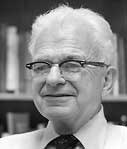Dorwin Cartwright
Dorwin “Doc” Cartwright, one of the founders of the field of group dynamics, died of chronic renal failure July 18 in Santa Barbara, Calif. He was 93.
“Doc Cartwright was one of the pioneers in the field,” says social psychologist James S. Jackson, director of the Institute for Social Research (ISR), where Cartwright was the founding director of the ISR Research Center for Group Dynamics.

“Doc and Frank Harary were the first to demonstrate how mathematics in the form of graph theory could be used to analyze social networks,” says psychologist Eugene Burnstein, one of Cartwright’s first students at Michigan. “This approach allowed social networks to be analyzed both as objective systems — who helps, talks to or beats up whom, for example — as well as psychological or cognitive systems — how people perceive or represent these objective systems in their heads.”
During World War II, Cartwright joined the Division of Programs and Surveys in the U.S. Department of Agriculture, where he met Rensis Likert and Angus Campbell. His studies of motives for the purchase of war bonds and the effect of bombing on civilian morale in Germany were among the first social surveys to use psychological concepts. In 1945 Cartwright helped Lewin found the Research Center for Group Dynamics at the Massachusetts Institute of Technology. Following Lewin’s death in 1946, Cartwright became the center’s director, bringing it to the University — one of the first in the nation to offer a doctorate in social psychology. The center joined the Survey Research Center to create ISR.
In Ann Arbor Cartwright led research projects that included work with a United Auto Workers local to provide an objective evaluation of a program designed to improve the acceptance of minority group members. In another laboratory experiment, Cartwright and colleagues investigated how discrimination affected group morale. Working with labor unions, corporations and educational institutions, Cartwright and colleagues deliberately moved the developing field of group dynamics out of the ivory tower and into practical use.
In his 31 years at Michigan, Cartwright’s research and writing topics included the mathematical foundations of group dynamics, the sources of social power, the nature of group structure and the causes of risk taking in groups.
Cartwright was born in Des Moines, Iowa, in 1915, the son of a preacher. During his early years he often moved throughout the country. He received his bachelor’s degree from Swarthmore College in 1937 and his master’s degree from Harvard University in 1938.
In 1940 he received his doctoral degree in psychology from Harvard, and spent a postdoctoral period working with Kurt Lewin at the State University of Iowa.
Cartwright is survived by Barbara, his wife of nearly 70 years; daughters Patricia Alice Thomas of Leesburg, Ohio, and Susan Cartwright Clark of Charlottesville, Va.; son Peter of Durham, N.C.; and many grandchildren and great-grandchildren.
A memorial service will be Aug. 6 in Santa Barbara. Another service will be held at a later date in Michigan. For more information contact Patrick Shields at (734) 764-8369.

